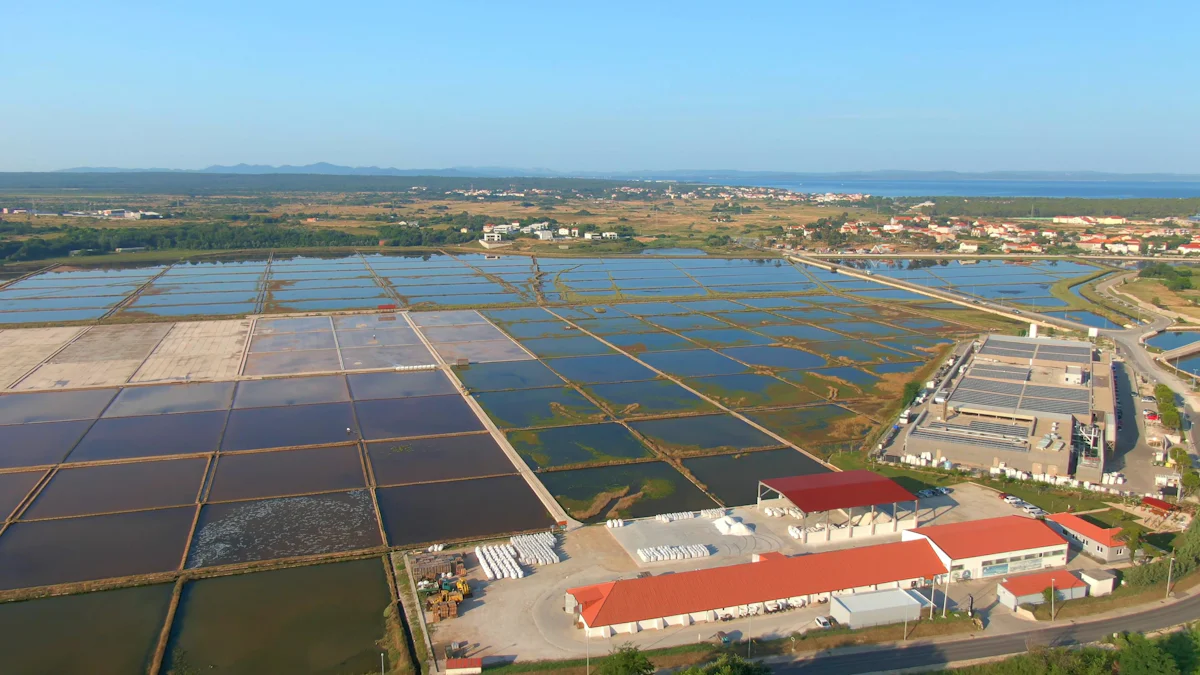3 Ways Manufacturing Chains Are Going Green Today

Manufacturing chains are undergoing a remarkable transformation as businesses prioritize sustainability to meet pressing environmental goals. Companies like Apple exemplify this shift by integrating renewable energy, reducing waste, and adopting circular economy practices. Apple’s commitment to innovation has driven its supply chain to achieve significant milestones, such as reducing emissions by 40% since 2015 and powering operations with 100% renewable energy. These efforts not only minimize environmental impact but also enhance efficiency and profitability. As consumer demand for eco-friendly practices grows, manufacturing chains must embrace sustainable strategies to remain competitive and responsible.
Transitioning to Renewable Energy Sources in the Manufacturing Chain

Solar and Wind Energy Adoption in Supply Chains
Apple has emerged as a leader in renewable energy adoption within the manufacturing chain. The company’s commitment to achieving 100% renewable energy across its supply chain by 2030 has set a benchmark for others in the industry. Over 200 suppliers, accounting for more than 70% of Apple’s direct manufacturing spend, have pledged to use clean energy sources like solar and wind for all Apple-related production. This initiative not only reduces reliance on fossil fuels but also significantly mitigates greenhouse gas emissions.
“We’re designing our products to be less carbon intensive, increasing our use of recycled and renewable materials, and transitioning our entire supply chain to 100% renewable energy.” – Apple’s Environmental Strategy
Apple’s Supplier Clean Energy Program has supported the development of over 16.5 GW of renewable energy projects globally. These efforts demonstrate how collaboration with suppliers can drive large-scale adoption of sustainable practices. For instance, many of Apple’s partners have transitioned their operations to solar and wind power, showcasing the feasibility of clean energy in manufacturing processes. By harnessing these renewable sources, Apple and its suppliers are paving the way for a greener future.
Enhancing Energy Efficiency in Manufacturing
Energy efficiency plays a crucial role in advancing sustainability within the manufacturing chain. Companies are increasingly adopting energy-efficient machinery and processes to minimize energy consumption. Apple exemplifies this approach by integrating advanced technologies into its production facilities. These innovations not only reduce energy usage but also enhance operational efficiency.
Factories that implement energy-efficient systems often achieve remarkable results. For example, some Apple suppliers have reported significant reductions in energy consumption after upgrading their equipment and optimizing workflows. These case studies highlight the tangible benefits of prioritizing energy efficiency. By investing in modern machinery and streamlined processes, manufacturers can lower operational costs while contributing to environmental conservation.
The transition to renewable energy and energy-efficient practices underscores the importance of innovation in achieving supply chain sustainability. Apple’s leadership in this area serves as a model for other companies seeking to align their operations with global sustainability goals.
Embracing Circular Economy Principles for Supply Chain Sustainability
Recycling and Reusing Materials in Manufacturing
Apple has revolutionized recycling within the manufacturing chain by implementing cutting-edge initiatives. One of its most notable innovations is the Daisy robot, which disassembles iPhones to recover valuable materials. This advanced technology extracts components like cobalt, tungsten, and rare earth elements, ensuring these resources are reused instead of discarded. By recovering such materials, Apple reduces the need for mining, which often harms ecosystems and consumes significant energy.
The company also incorporates recycled aluminum and rare earth elements into its products. For instance, Apple’s MacBook Air and Mac mini feature enclosures made entirely from recycled aluminum. This approach not only conserves natural resources but also minimizes greenhouse gas emissions associated with raw material extraction. Recycling aluminum, as highlighted by studies, consumes far less energy than producing it from virgin sources. According to the EPA Individual Waste Reduction Model (iWARM), recycling just a small amount of material can save substantial energy, underscoring the environmental benefits of Apple’s efforts.
Apple’s commitment to sustainability through recycling demonstrates how manufacturers can integrate eco-friendly practices into their operations. These initiatives highlight the potential of recycling to conserve energy, reduce waste, and lower the carbon footprint of the manufacturing chain.
Designing for Longevity and Repairability
Apple has embraced eco-friendly product design by prioritizing longevity and repairability in its products. Modular designs, which allow individual components to be replaced or upgraded, extend the life cycle of devices. For example, Apple’s Mac Pro features a modular structure, enabling users to replace parts like memory and storage. This design philosophy reduces the need for frequent replacements, ultimately decreasing electronic waste.
Repair-friendly products also play a crucial role in waste reduction. Apple’s Self Service Repair program provides customers with tools and instructions to repair their devices. This initiative empowers users to fix common issues, reducing the number of discarded products. By making repairs accessible, Apple encourages a culture of reuse, aligning with circular economy principles.
The impact of these strategies extends beyond waste reduction. Designing for longevity and repairability fosters consumer trust and loyalty, as customers value durable and sustainable products. Apple’s approach serves as a model for other manufacturers seeking to balance innovation with environmental responsibility.
By integrating recycling, reuse, and repairability into its operations, Apple showcases the transformative potential of circular economy principles. These efforts not only enhance sustainability but also set a benchmark for the manufacturing chain to adopt greener practices.
Reducing Carbon Footprints Through Supply Chain Optimization

Streamlining Logistics and Transportation with JUSDA
JUSDA has introduced transformative solutions to reduce carbon emissions in logistics and transportation. The company actively incorporates electric and low-emission vehicles into its operations, significantly lowering the environmental impact of product transportation. These vehicles not only reduce greenhouse gas emissions but also contribute to cleaner air quality in urban areas. By prioritizing sustainable transportation methods, JUSDA sets a strong example for the manufacturing chain to adopt eco-friendly logistics practices.
The JusLink platform, developed by JUSDA, optimizes shipping routes to enhance efficiency and minimize fuel consumption. This intelligent system leverages advanced technologies to analyze real-time data, ensuring that transportation routes are both cost-effective and environmentally friendly. Companies using JusLink have reported substantial reductions in carbon intensity levels, highlighting the platform's ability to streamline logistics while supporting sustainability goals. By integrating such innovative tools, JUSDA demonstrates how technology can drive green manufacturing practices and reduce the carbon footprint of supply chains.
Partnering with Sustainable Suppliers
Apple’s Supplier Clean Energy Program exemplifies the power of collaboration in achieving sustainability. Since its launch in 2015, the program has encouraged suppliers to transition to renewable energy sources, resulting in the avoidance of 18.5 million metric tons of CO₂e emissions in 2023 alone. Apple’s commitment to carbon neutrality by 2030 has inspired over 200 suppliers to adopt clean energy solutions, reinforcing the importance of partnerships in driving large-scale environmental impact. This initiative aligns with Apple’s broader strategy to integrate green manufacturing practices across its supply chain.
JUSDA also plays a pivotal role in fostering partnerships with manufacturers to adopt carbon-neutral practices. By collaborating with suppliers, JUSDA ensures that sustainability remains a core focus throughout the manufacturing chain. The company’s efforts include promoting the use of renewable energy, optimizing resource allocation, and implementing innovative solutions like the JusLink platform. These collaborations not only support carbon neutrality but also enhance operational efficiency and reduce costs for manufacturers. JUSDA’s proactive approach highlights the critical role of partnerships in achieving a sustainable future for global supply chains.
By streamlining logistics and fostering sustainable partnerships, companies like JUSDA and Apple showcase the potential of innovation in reducing carbon footprints. These efforts underscore the importance of adopting green manufacturing practices to meet global sustainability goals and ensure long-term environmental responsibility.
Manufacturing chains are evolving to address environmental challenges by adopting renewable energy, circular economy principles, and carbon footprint reduction strategies. Companies like Apple and JUSDA exemplify leadership in this transformation. Apple’s innovative practices, such as integrating clean energy and recycling materials, set a high standard for sustainability. JUSDA’s advancements in logistics optimization and supplier collaboration further demonstrate the potential of green manufacturing. These efforts highlight the necessity of sustainable practices to combat climate change, conserve resources, and ensure long-term economic value for global manufacturing industries.
See Also
Top 5 Trends Shaping Future Supply Chain Efficiency
Robotics Innovations Driving Sustainability in Supply Chains
Comprehensive Guide to Eco-Friendly Supply Chain Transportation
Enhancing Supply Chain Solutions for Advanced Manufacturing Challenges
